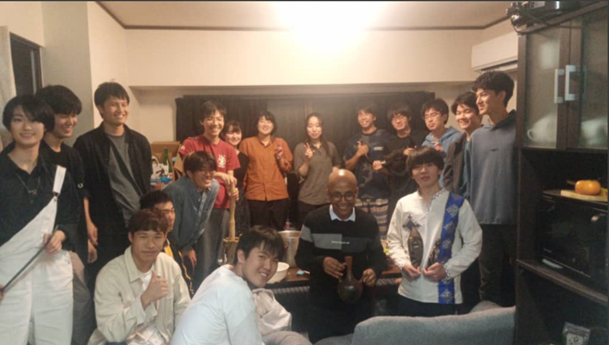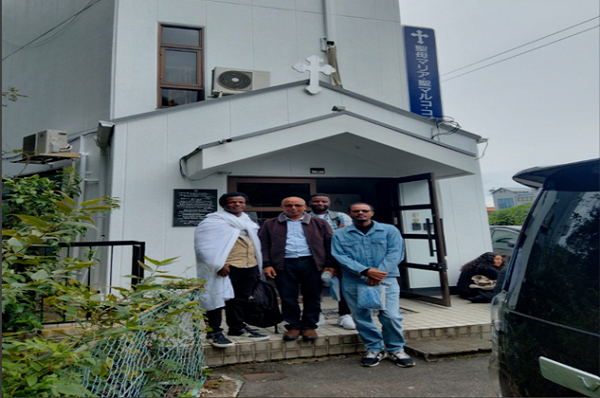Unforgettable experiences, and outcomes of participation at Kyoto University (by Yitagesu Habutu, Addis Ababa University, Ethiopia)
I am Yitagesu Habtu, a candidate for a Doctor of Philosophy in Public Health at Addis Ababa University. My research focuses on occupational mental health. When I was in high school, I read about Japan from the works of esteemed Ethiopian writer, Honorable Doctor Kebede Michael, specifically in his work “ጃፓን እንደምን ሰለጠነች (Japan Endemin Seletenech) ”, which may have the equivalent English translation as “How Japan get civilized”. Similarly, I listened about Japan from legendary Ethiopian musician, Honorable Doctor Tilahun Gesese in his song “ጃፓኗን ወድጀ (Japanuane Wedeje)”. Consequently, I was very excited to have the opportunity to be an auditing and exchange student at Kyoto University, specifically at the Graduate School of Asian and African Area Studies (KU ASAFAS), from September 29, 2023, to March 22, 2024. And, Japan would be my first international travel experience in my life.
I am grateful to Kyoto University Graduate School of Asian and African Area Studies and Addis Ababa University for establishing the student exchange program and providing me with this opportunity. I would also like to express my gratitude to Prof. Morie Kaneko, Prof. Hednori Harada, Prof. Masayoshi Shigeta, Dr. Susumu Aihara, Prof. Mirigissa Kaba, Prof. Abera Kumie, Dr. Samson Wakuma, Dr. Samson G/Medhin, Prof. Damen H/Mariam, and the dedicated staff of KU ASAFAS for their support. I also would like to present my sincere appreciation to Mr Bedilu Mekonen, a Japanese for introducing Kyoto City. Although my time at Kyoto University was short, it was an extraordinary experience for me. In this article, I will share highlights from my stay at Kyoto University and in Kyoto Okazaki Kokusai Kohryu in the following themes.
A. My glance at the academic environment: I had the privilege of being part of Kyoto University-ASAFAS, one of Japan’s most prestigious educational institutions. During my flashlight stay, I learned a lot from the unique Japanese academic work culture. It was truly enriching despite my few immersions due to time shortage. I learned a lot about time management at every seminar and meeting, strong work communication and programming through timely copying travel and updates, workplace hygiene and waste management culture, respectful and supportive faculty members, workplace safety, well-equipped libraries, safe use of infrastructure, availability of supplies and healthful facilities required for an ideal academic environment for learning and personal growth. I observed the university’s dedication to academic excellence and research innovation throughout the African-Japan-engaged research seminars and conferences held during my stay. I truly wish to have an interdisciplinary collaboration that fosters a stimulating academic atmosphere for the Universities of my country like Kyoto University.
B. My Japanese Language Class: Throughout my Japanese Language classes, a delightful mosaic Japanese writing system blending kanji, hiragana, and katakana told me how Japanese fathers and mothers were very dedicated to sharing deep concepts, and native identities, respecting others’ identities and adding flavors to indigenous and diverse expression. I understood language is not a mere tool of communication, but a powerful architecture of the self. The intonation, diverse meanings of a single word or phrase, and architectural style of writing letters perhaps tell me how the Japanese reached this level of civilization. The teaching methods of the Japanese Language also taught me a lot about making far to the near. Every moment of the class was funny and enjoyable to all African short-term exchange students from Madagascar, Senegal, Tanzania, the Democratic Republic of Congo, and Ethiopia. The Japanese presentation was also a very memorable experience for me to explore the Japanese-Ethiopian relationship for the future. I hope I will easily create very intent to learn Japanese and communicate with Japanese more in the future. The following pictures give me a memory of my Japanese classes with a very lovely classmate.


C. My “Innovative Africa and SDGs” Class: Throughout the class of educational Networking programs for human resources development in Africa’s SDGs, I had a holistic opportunity. The multicultural and interdisciplinary presentation made by professors at Kyoto University made me think about paradigm shifts from specialist to holistic points of view for sustainable human health and development. The environmental and natural resource conservation and management, climate change, energy conservation and management, developmental economics, indigenous knowledge sharing, sustainable hygiene and sanitation, and other SDGs gave me a full picture of human health and development.

D. Experience in Seminar, Research, and Academic Advisee in KU-ASAFAS: A weekly seminar also gave me an exciting opportunity to share knowledge and experience. It encouraged me to present and discuss my research findings and created a collaborative environment of different perspectives. The academic advising lecturing, and life support were interesting. The presentation at the 4th international conference held on 18 December 2023 was the best opportunity to know African and Japanese researchers. The topics presented were from a variety of professional disciplines and developmental research approaches. I drafted three manuscripts to be published as my PhD requirement through support, motivation, and guidance from my academic supervisor, Prof. Harada.

E. My visiting experiences: I gained very important experiences from visiting the historical Japanese National Museum of Ethnology, Kyoto International Manga Museum, Cha-do Research Centre, and Terra Renaissance organized by IAFPs. The overall efforts of establishing the National Museum of Ethnology also gave me insights into how Japan is contributing to the world’s anthropological and Ethnological research. The research and archival of heritages will be a potential source of the world’s cultural and historical value to support development. The research and documentation efforts would be maybe a lesson for multiethnic nations including Ethiopia. Especially, Kawase’s nine books about Ethiopia, the man I found in one of the research units of the national museum inspired me to learn the ups and downs stairs of life paid for the kind society. Kyoto International Manga Museum also taught me a lot about how Art universities can make a difference in archiving the community’s art and saving values for future generations. The Terra Renaissance also taught me how humanity makes a difference in supporting humanity itself and making a sense of life to the ultimate vision and destiny.

F. My workplace socialization: The staff at Kyoto University-ASAFAS exhibited exceptional sociability and warmth. Their dedication to ensuring a comfortable and inclusive environment for international students was commendable. The faculty members were approachable and always willing to provide guidance and support. Their expertise and willingness to engage in meaningful discussions greatly enhanced my academic journey. In addition to academic advisees, professors are also very friendly. The following pictures highlight the details.



G. Socialization, Culture, Language, and Food: Everywhere I went such as supermarkets, restaurants, roadsides, and at my residence, almost all the Japanese people I met were very kind, polite, respectful, and cooperative. People understood me very well despite my difficulty in speaking Japanese, and I read their feelings when something seemed to be difficult to communicate with. I felt how Japanese when the taxi driver dropped me at the back of Kyoto Okazaki International House, I was trying to search the gate. About 80s-year-old man just understood how I was troubled and took me to the international house. I found Japanese are very welcoming people. If they have encountered one culture, they are very curious. I remember one of the friendliest Japanese who invited me to a memorable dinner at his home and he cooked Ethiopian food in his home. I was surprised to encounter such cultural understanding and curiosity. I was very excited to enjoy almost all Japanese foods at my invitations. I enjoyed a variety of Japanese cuisines, such as Okonomiyaki, Ramen, Sushi, and Soba.



H. Aftermath of Attending the short term exchange program: I successfully achieved my priority goal, analysing and drafting manuscripts to be published for my PhD requirement in the most descent arrangements made by Kyoto University’s prestigious Graduate School of Asian and African Area Studies (KU ASAFAS). Along with intensive modules, I drafted three manuscripts through close supportive supervision by academic advisors. Of the three manuscripts, one has been accepted for publication and other manuscripts are under review and hopefully will be published in the next few months. As soon as these requirements are fulfilled I will be graduated by next year.
In addition to the immediate outcome, the auditing modules including innovative Africa and SDGs, and research seminars on Africa area studies will hopefully help me further develop my career trajectory. The linkage created during the exchange program will help me in future research collaborations with professors of Kyoto University-ASAFAS. My academic advisor is still supporting me in research aspects. My time management, communication, and innovative approaches hopefully changed me compared to my previous status and will also shape my future work in academia and inspire Kyoto University-ASAFAS.
Best Regards.
